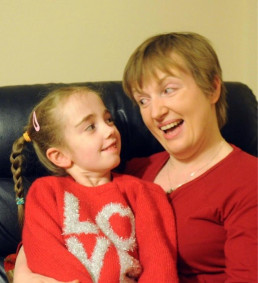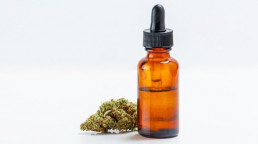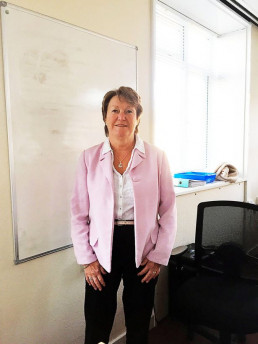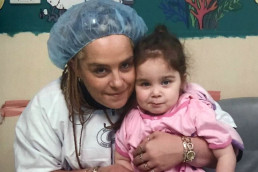Professor David Nutt: “Why We Should Decriminalise Personal Possession Of All Drugs”
Professor David Nutt: “Why We Should Decriminalise Personal Possession Of All Drugs”
- Professor David Nutt is coming to Manchester to talk about the benefits of decriminalising drugs in the UK
- The former chief drug advisor to the British Government was dismissed for calling for the legalisation of medical cannabis
- Professor Nutt has published 400 original research papers, a similar number of reviews and books chapters, and eight government reports on drugs
- All proceeds from the event will be going to David’s science-led drug charity, DrugScience
Legendary British psychiatrist Professor David Nutt is coming to Manchester to give a lecture on “Why We Should Decriminalise Personal Possession Of All Drugs.”
The world-renowned drugs expert made headlines when he was dismissed as Chairman of the Advisory Council on the Misuse of Drugs after publicly disagreeing with the Conservative Government’s reclassification of cannabis from Class C to B.
In the latest MCR: Talks lectures, Professor David Nutt will be discussing how the attempt to control drug use and harms through punitive sanctions (i.e. the “War on Drugs”) has been a global failure.
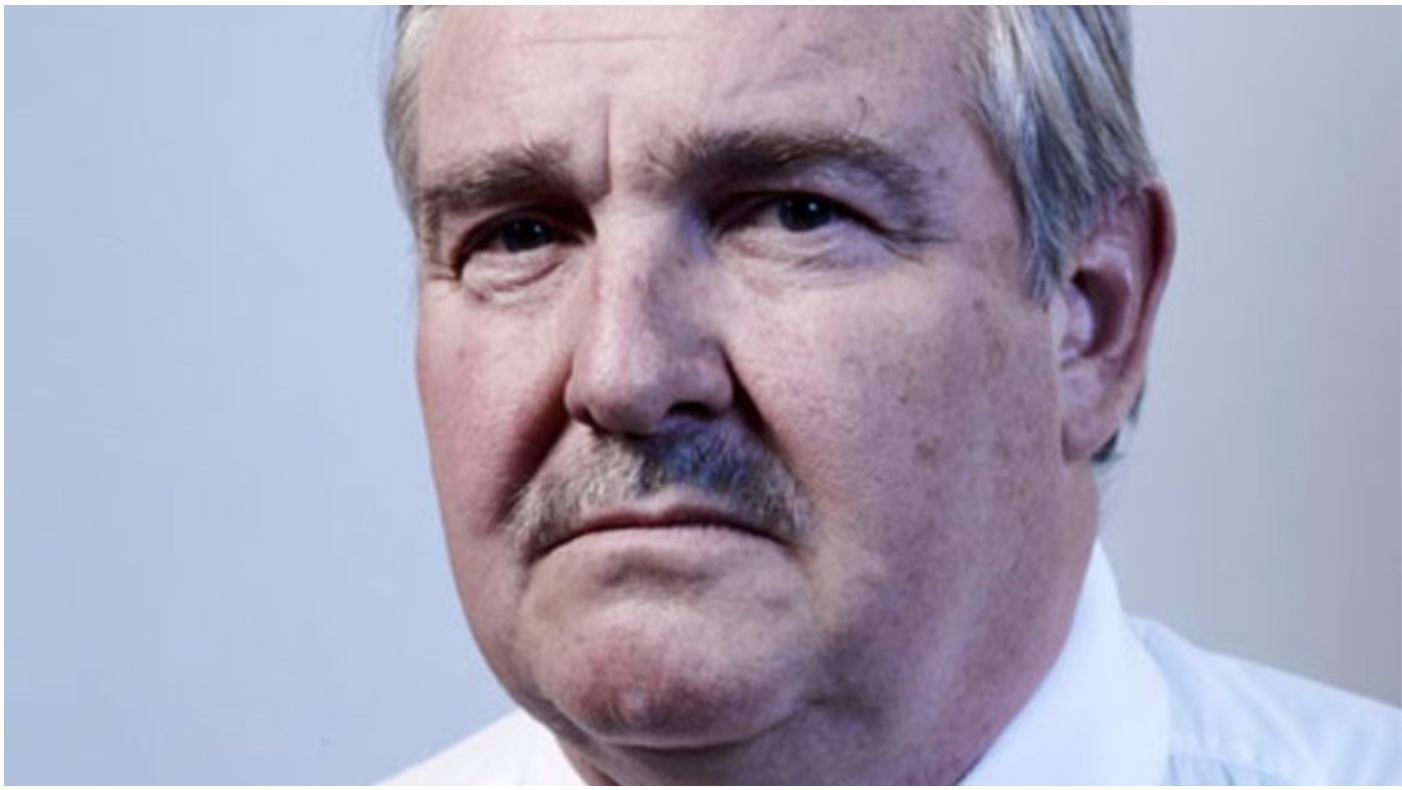
In this vehement talk, Professor Nutt will explain the reasons such failure was predictable and illustrate how decriminalisation policies (as pursued in other countries such as Portugal, Netherlands etc.) offer a rational and more humane way forward, that also have huge economic and research gains for society.
“Cannabis is the oldest medicine in the world – why is it banned?“
– Professor David Nutt]Professor Nutt will also explore new research carried out by DrugScience.org on estimating the comparative values of different policy regimes for some common drugs.
Proceeds from this event will be donated to DrugScience, David’s own independent science-led drug charity.
DrugScience brings together leading drugs experts from a wide range of specialisms to carry out ground-breaking original research into drug harms and effects.
The entire experience will include:
- Fascinating science lecture in London on global drug policy
- World’s leading expert on Addiction, Neuropsychopharmacology and Brain Science
- Exclusive Q&A with Prof David Nutt
The talk will be held at the University of Manchester (Reynold Building), Altrincham St, Manchester, M1 7JA.
Tickets are limited but can be bought from FunZing’s official website.
Coming Home for Christmas: Vera Twomey finally secures medical cannabis license for her daughter
Coming Home for Christmas: Vera Twomey finally secures medical cannabis license for her daughter
- Vera Twomey has finally secured a medical cannabis license for her young daughter, Ava Barry, who suffers from severe epilepsy
- Ava has been forced to flee to Holland where she could legally access medical cannabis
- Before cannabis, Ava was suffering 100s of epileptic seizures a week
- “We’ll be home for Christmas and she’s doing really, really well.”
Vera Twomey has finally won the right for her daughter to legally access medical cannabis in her own home country, Ireland.
Ava Barry, 7, from Aghabullogue, a small village of in Cork, suffers from a rare form of epilepsy called Dravet Syndrome, which could leave the young girl suffering hundreds of seizures a week. Since moving to Holland, and gaining legal access to full-extract cannabis oil (containing THC), the number of seizures Ava was experiencing vastly decreased, from up to 500 a month to less than 10.
Ava has also learned how to speak and read since beginning cannabis treatment.
Vera made the announcement live on her Facebook last night:
“I just want to let you know that we have some really, really, good news that Ava has been granted the licence for the medical cannabis and we’re coming home.“
– Vera Twomey
Discussing the announcement, an ecstatic Vera declared:
“I just want to let you know that we have some really, really, good news that Ava has been granted the licence for the medical cannabis and we’re coming home.
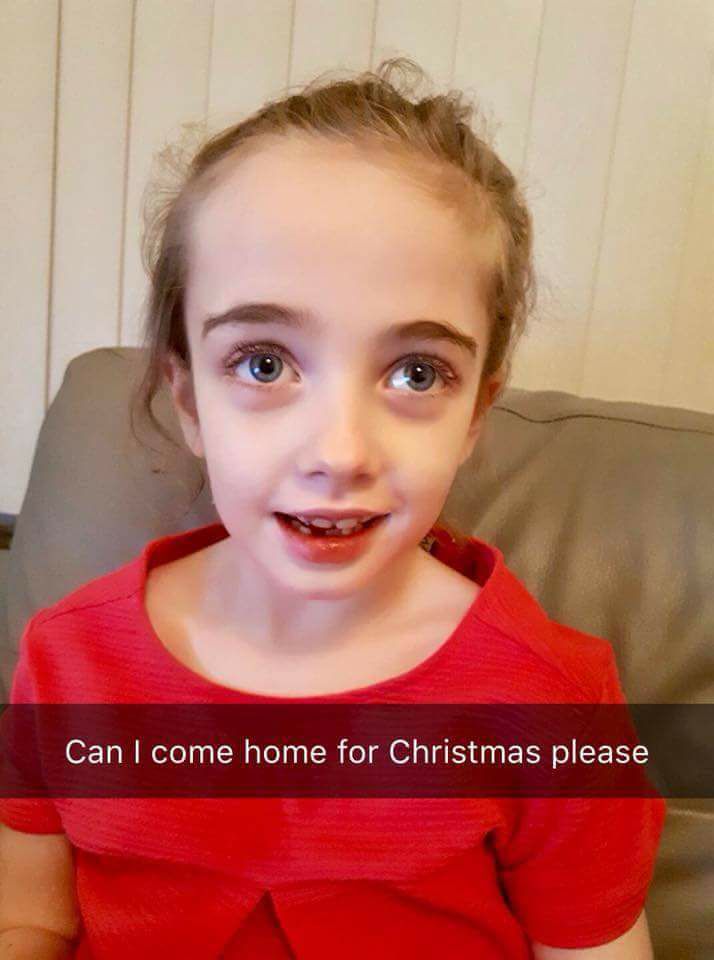
“I just wanted to thank everyone for their support, and we’ll be home for Christmas!”
Ireland’s Minister of Health, Simon Harris, who for so long denied the young girl the right to a choice in her medication, confirmed that he finally granted a licence for Ava:
“I’m very pleased I was in a position to sign another licence for a citizen in this country, a little girl, to access a medicinal cannabis product.
“It’s the third licence since becoming minister for health. All licences that have been validly submitted with the support of a monitoring consultant in Ireland have been granted.” We have been covering Vera and Ava’s inspiring journey over the past year.
The courageous mother has done everything in her power to attain a medical cannabis license for her daughter.
From walking 260km from Cork to Dublin to raise awareness of Ava’s condition, to being forced to break up her family by moving to Amsterdam to gain legal access to the only medication proven to work for her young daughter, Vera has truly worked hard to raise awareness of Ava’s condition and how medical cannabis helps her.
While Ava is only the third patient to be granted a license for medical cannabis containing THC in Ireland, there is a growing hope that more patients will be able to attain the same license.
Vera’s high-profile campaigning undoubtedly helped win over the hearts and minds of the Irish public, in turn helping to force Simon Harris’ hand at granting the license.
Ava’s story can be followed on her official Facebook page, ‘Hope for Ava’.
Raising Aidan: Heroic South African mother risks freedom to treat son with cannabis oil
Raising Aidan: Heroic South African mother risks freedom to treat son with cannabis oil
- Brave Melissa Botha has been using cannabis to treat her son who suffers rare genetic disorder Costello Syndrome
- Aidan is 1 of only 3 South Africans diagnosed with the condition which leaves him “very prone to cancer”
- Cannabis is still illegal in South Africa
- Raising Aidan Foundation launches February next year
Medical cannabis patients in South Africa are in a legal limbo.
Despite the South African Medicines Control Council (MCC) publishing draft guidelines to legalise cannabis for medical reasons, the bill has yet to be passed, with no signs of it being close.
In June 2016, the South African Central Drug Authority (CDA) issued a statement claiming they were to take a “middle ground” on cannabis, i.e. decriminalisation. Patients and recreational users, however, have yet to see this be put into practice.
Melissa Botha has been treating her son, Aidan, 8, with medical cannabis since February this year, after 3 years of research. Aidan was diagnosed with Costello Syndrome when he was just 18 months old.
Costello syndrome is a disorder that affects many parts of the body, characterised by delayed development and intellectual disability, loose folds of skin (which are especially noticeable on the hands and feet), unusually flexible joints, and distinctive facial features.
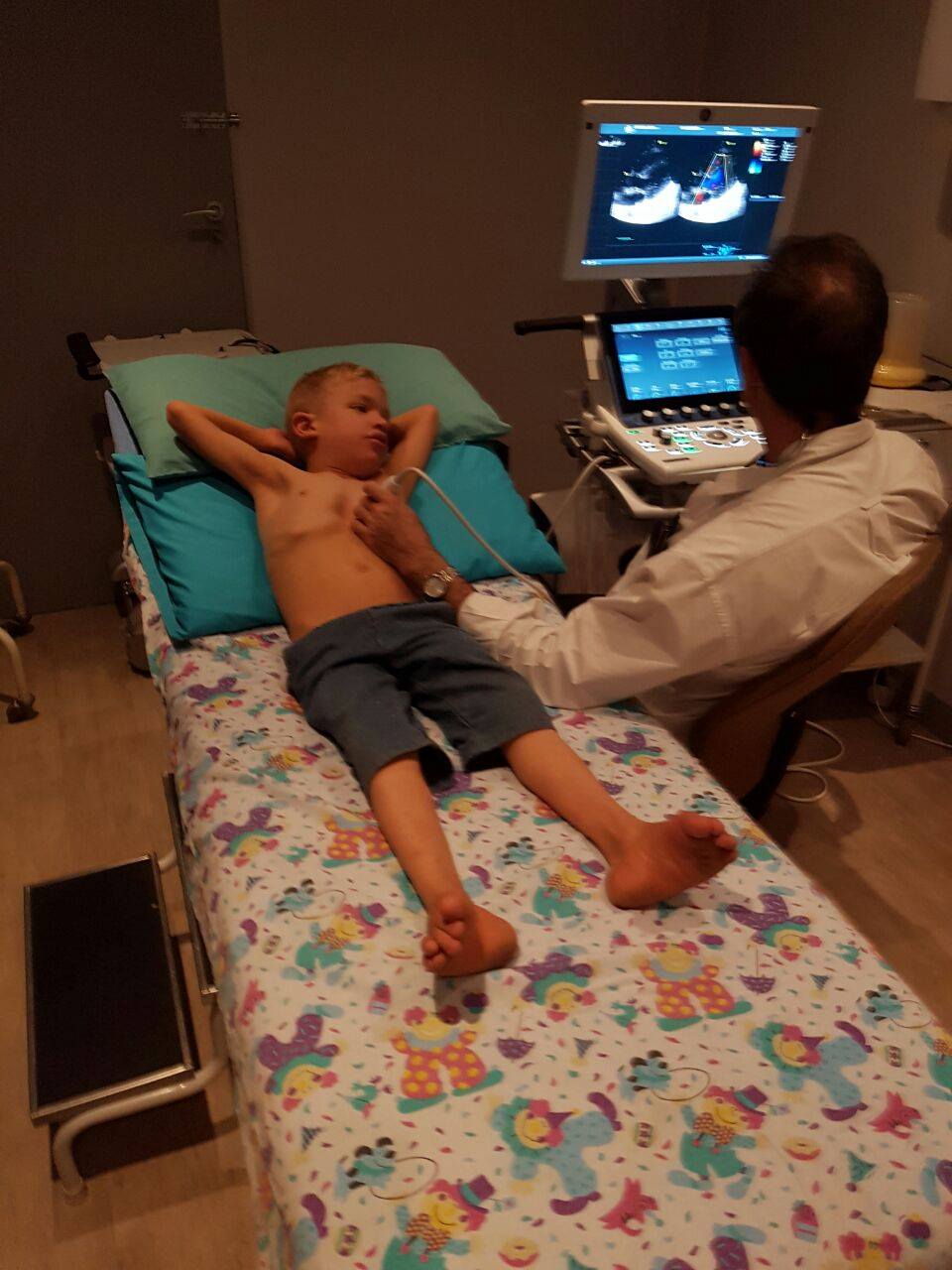
“It’s a very rare genetic disorder,” Melissa explained. “So rare that he’s only the 2nd of 3 known cases in South Africa, there’s only 400-500 worldwide who’ve been diagnosed.
“He also suffers with high anxiety and ADHD amongst lots of issues.”
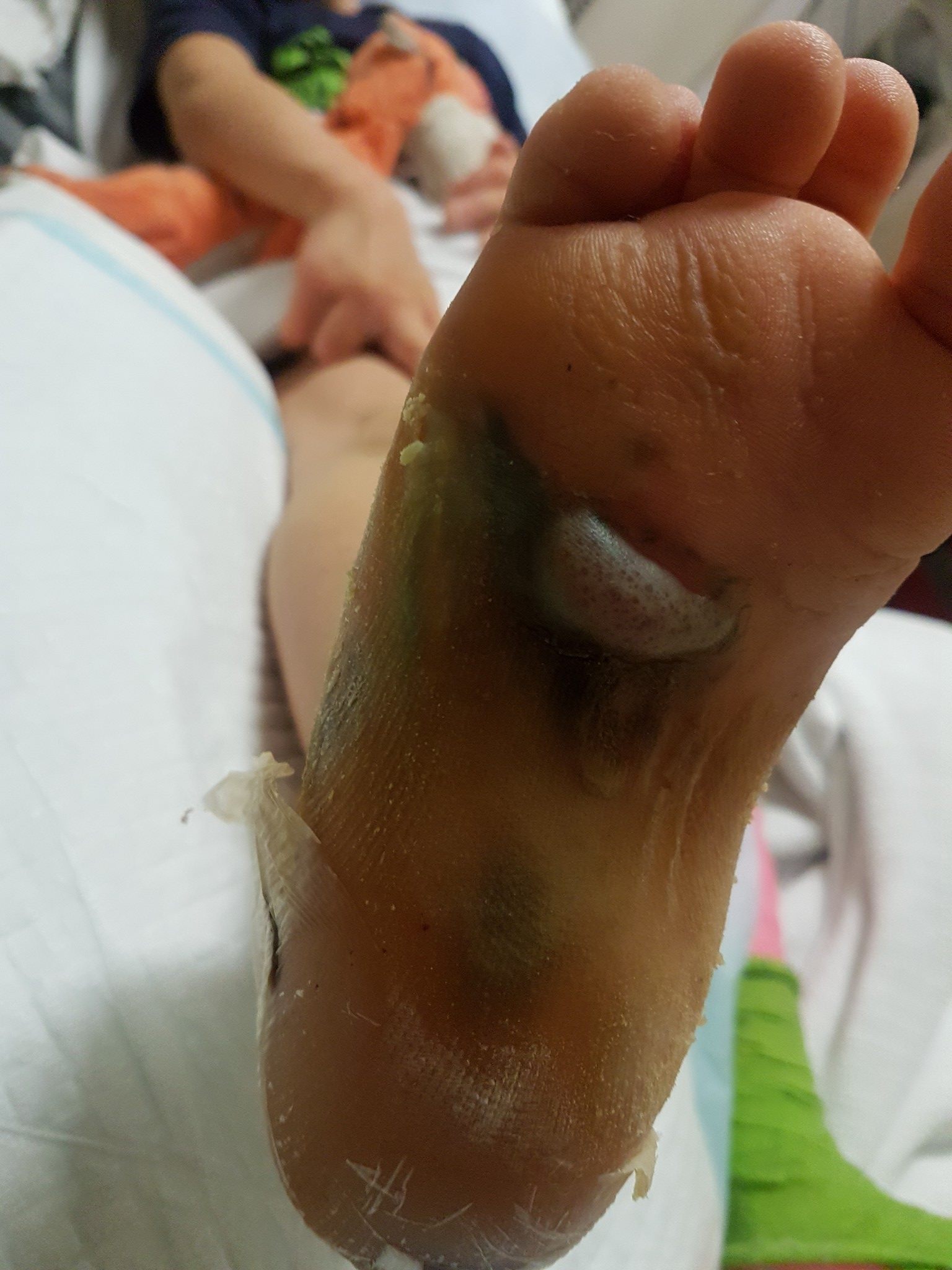
Aidan’s condition leaves the young child prone to developing cancer. He needs abdominal scans every 3 months to screen for cancerous tumours, and heart scans due to a thickened left ventricle wall.
A common reason patients chose to use medical cannabis rather than pharmaceuticals is due to the side-effects they leave the patient with.
Discussing why she opted to use cannabis, Melissa explained: “I’ve never been pro medication and always look at the root cause as opposed to plastering meds in to take away symptoms.
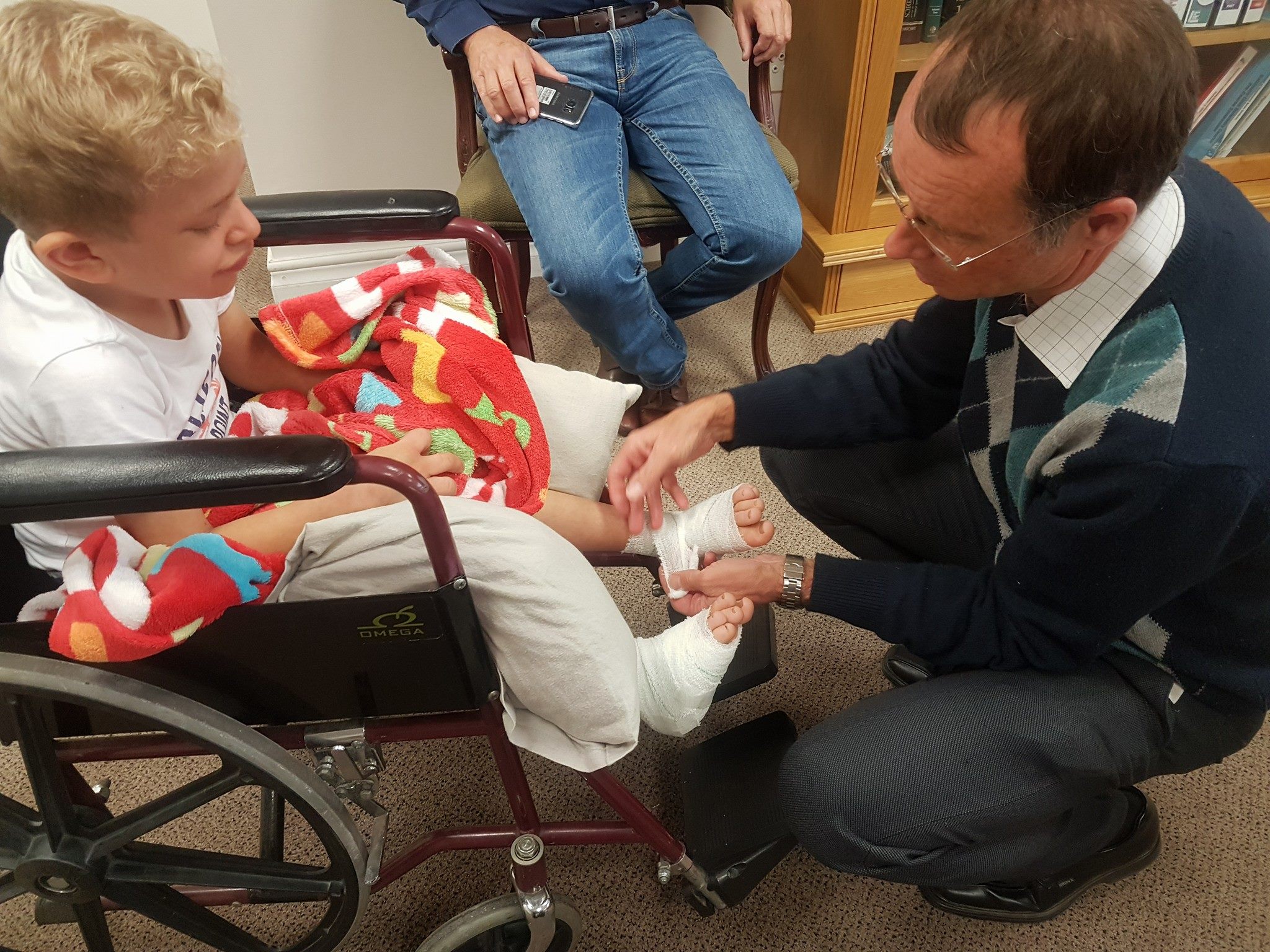
“I started him on cannabis oil because of its cancer curing abilities, thinking if it can kill cancer, it’s going to prevent his cancer cells from being activated.
“I really noticed a huge help when I used the oil as pain management after his last operation.
“Within minutes he would be calm as opposed to waiting 45 minutes for drugs to kick in.”
“Any authority challenging my decision as a parent to try and give my child the best chance at life when his condition is so rare, is a highly unlikely scenario.”
– Melissa Botha
Aidan does need some pharmaceutical medication, the side-effects of which have been softened by cannabis: “Aidan’s body, however, doesn’t produce enough growth hormone which is an integral part of the endocrine system. He has fluctuations with his sugar levels, etc.
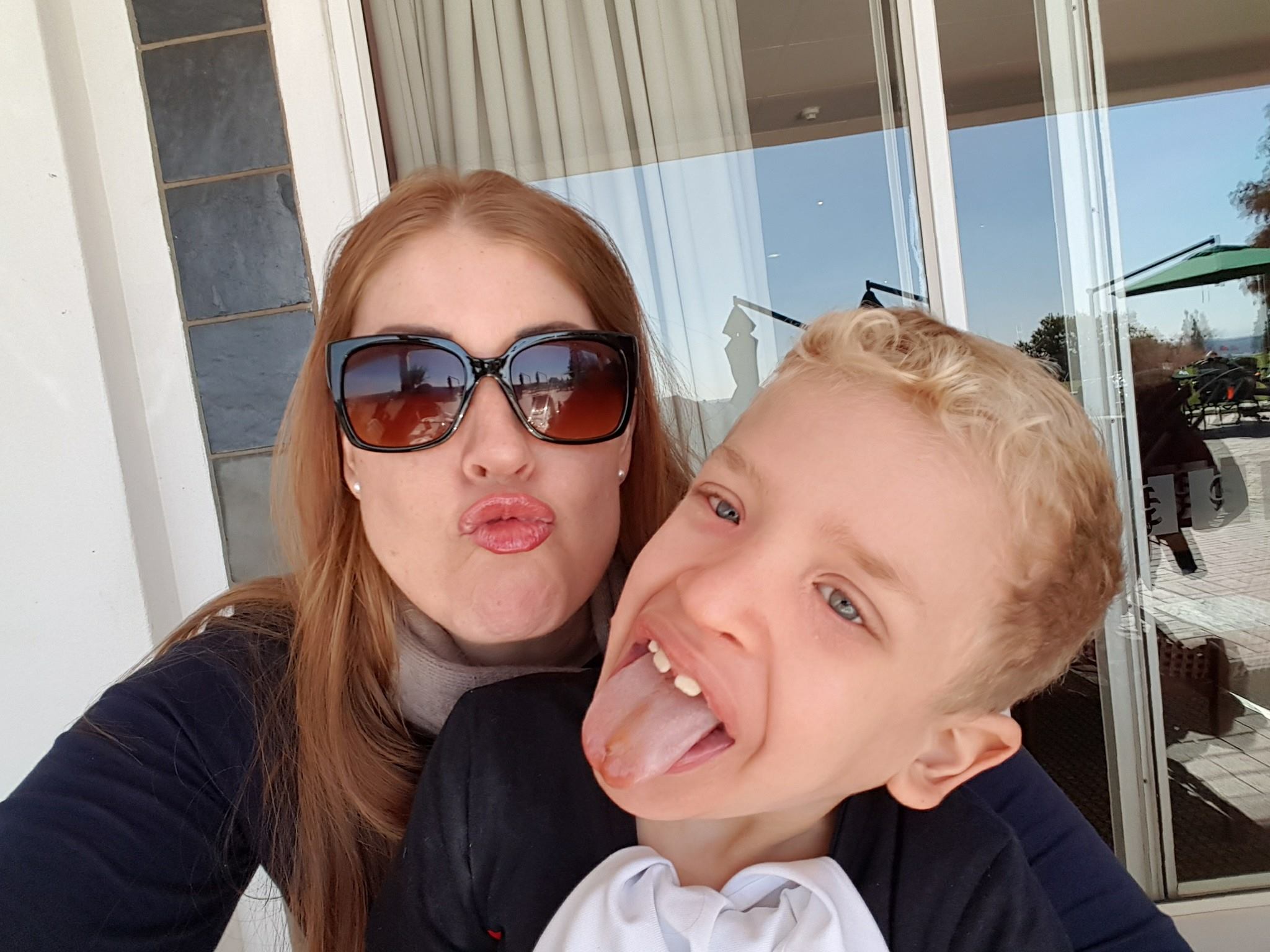
“He is on Norditropin, a growth hormone, which I inject him with every night. It’s done wonders for his growth, and had helped balance his sugars… but the potential side effects are hip plate shifting.
“Thankfully he is 100% in that department.”

Within weeks of Aidan first beginning treatment with cannabis oil, his condition began to improve:
“Within a week or two, Aidan was a new child!
“He could entertain himself for ages without needing mommy to be there watching and playing 100% of the time.
“He became much calmer and more relaxed, and also managed to concentrate for much longer. We are at 2 mins 40 seconds that he can ‘meditate’ without talking.” Even though Aidan is clearly being helped by cannabis, he is still breaking the law due to the excess of red tape surround cannabis laws. This does not stop Melissa from doing what she knows is right for her own child:
“Medicinal cannabis seems to be more and more accepted here.
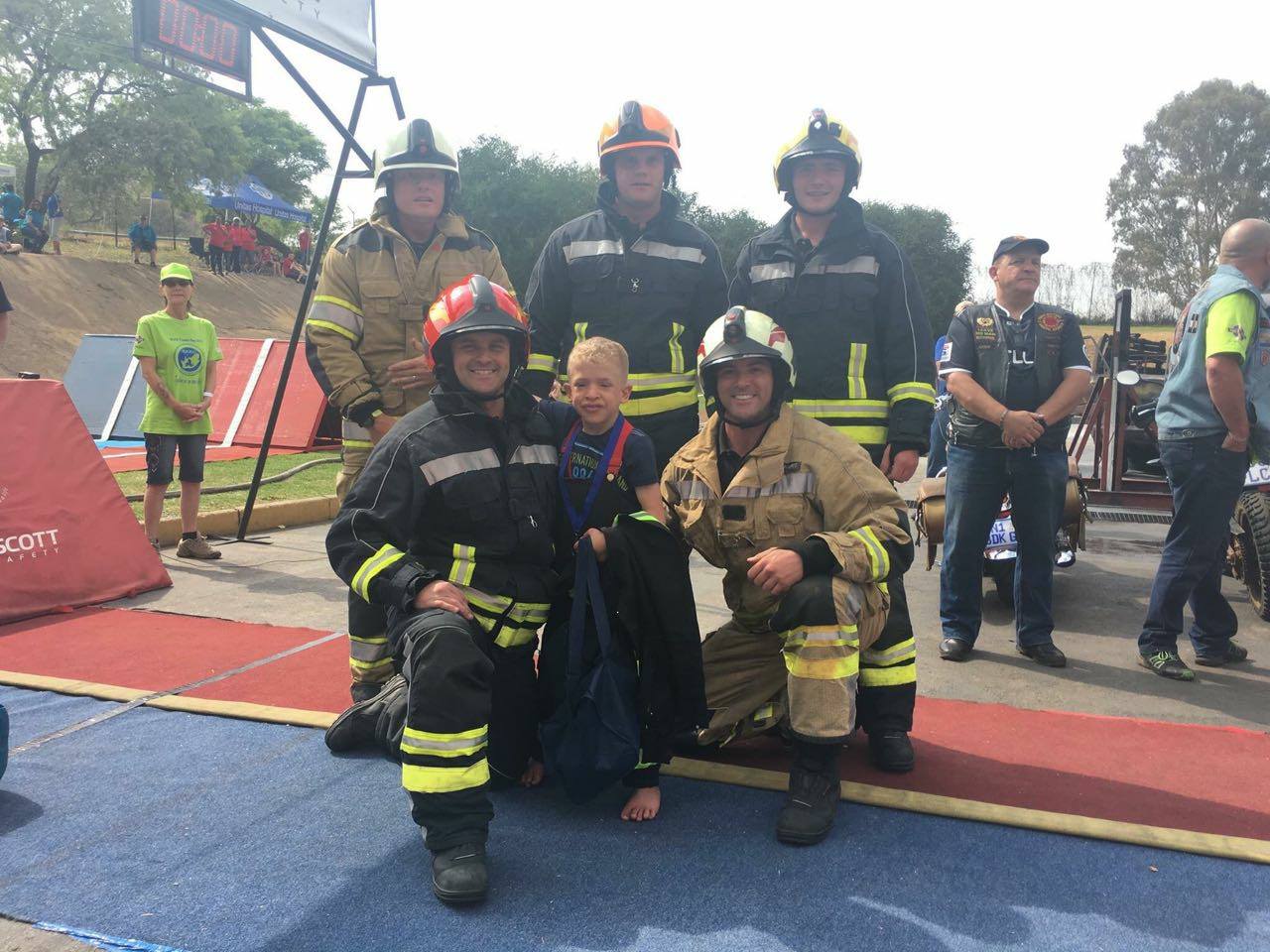
“More and more people are taking it without admitting to it. It seems legalisation is just a matter of when and not if.
“I’m not too concerned about it being illegal right now.
“Any authority challenging my decision as a parent to try and give my child the best chance at life when his condition is so rare, is a highly unlikely scenario.”
Melissa is hoping Aidan’s story can help change the negative perception of cannabis:
“My goal is to educate my audience so that the ‘stigma’ is eradicated.
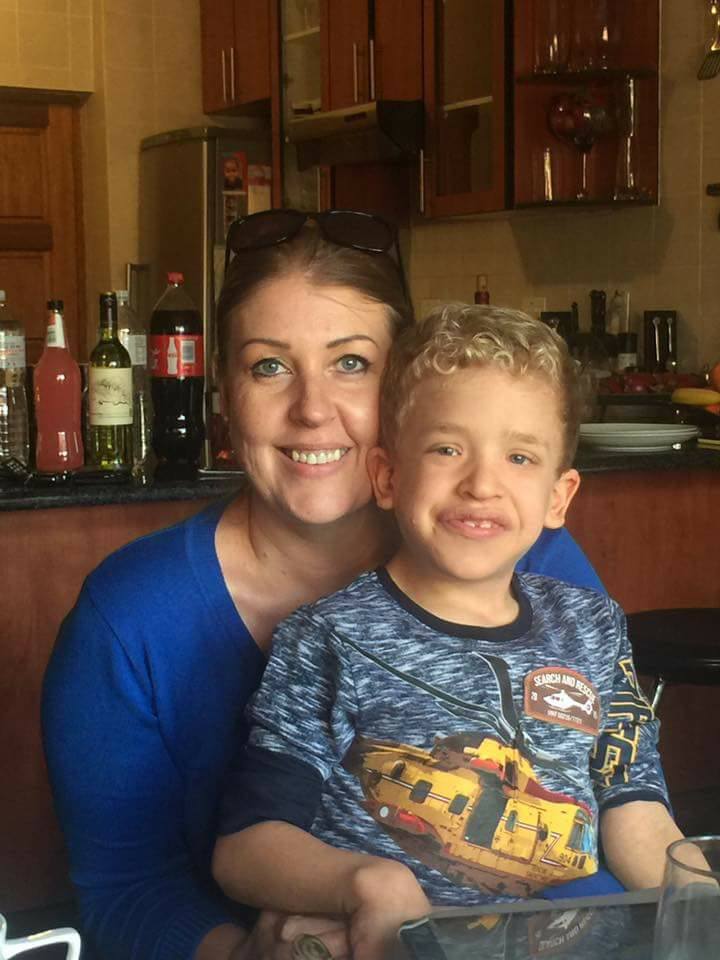
“I’m not a ‘pot head,’ I’m a mommy to a special child, who needs special care.
“When someone like myself begins educating people, they are more in a position to take the info, and not associate me or cannabis with ‘drug addicts’.” Inspired by the overwhelmingly positive reaction from the public to Aidan’s story, Melissa has established a charity in his honour:
“I also have set up The Raising Aidan Foundation.

“We’ll be officially launching on 17 Feb 2018 with an attempt to break a Guinness World Record for the most number of cupcakes in a mosaic! We are aiming at 44,000.”
Melissa and Aidan’s story could have been so much different if they were unable to access medical cannabis. Without cannabinoids, it is difficult to say whether Aidan would have made the medical progress he has.
Their story is also a strong reminder of the dire situation similar patients are facing in the UK.
While South Africa is in a transitional period, where the framework for medical cannabis could be ready to implement early next year, desperate patients in the UK have been reminded again and again that this Conservative Government does not care about their human rights.
Earlier this week, Theresa May vowing to continue fighting the country’s war on “drugs”, using research from her time in the Home Office to justify her policy approach.
That research, however, actually found, “[no] obvious relationship between the toughness of a country’s enforcement against drug possession, and levels of drug use in that country.”
Not only is the Conservative Government viciously targeting desperate medical patients, they are also wasting a tremendous amount of taxpayers’ money (£361 million) and the police’s time to do so.
It is time for the UK to legalise cannabis for medical purposes so more research can be done to understand the medical potential of the plant, and, more importantly, to allow British citizens the basic human right to a choice in their medication.
Malta’s government proposes to legalise cannabis-based medicines
Malta’s government proposes to legalise cannabis-based medicines
- Malta’s government has proposed allowing doctors to prescribe cannabis for medical purposes
- Family doctors will be able to prescribe cannabinoid-based medications without a specialist’s consent
- Herbal cannabis will remain illegal under proposals
Malta’s Parliament has begun debating legislation concerning the legalisation of the use of medical cannabis. Chris Fearne, Malta’s Health Minister, announced to reporters on Monday that he will be submitting an amendment to the Drug Dependence Act of 2015, which would remove some of the restrictions on medical cannabis.
Under current regulations, medical cannabis in Malta can only be prescribed by a specialist registered under the Medicines Act, a “narrow” selection. Every medical-cannabis product prescribed had to be approved by a local medicines authority or the EU’s medicines watchdog.
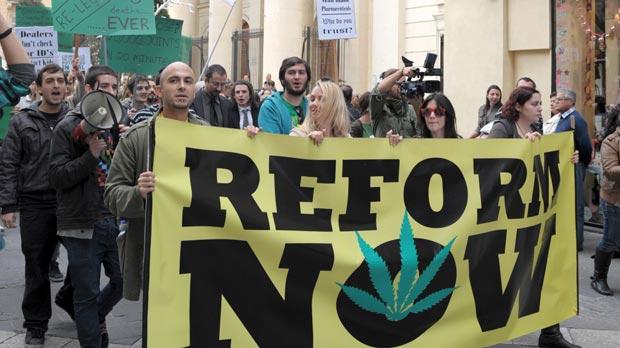
Mr. Fearne argued that this current system “involved too much bureaucracy and many could not get access to the medications they needed.”
If approved, Mr. Fearne’s amendment would allow patients to get a prescription for medical marijuana without having to go through the lengthy process of attaining approval from a specialist.
“No products prescribed by a doctor can be used for smoking, and these products can only be purchased from a pharmacy using a control card.”
– Malta Health of Minister, Chris Fearne
Discussing the details of the amendment, Mr. Fearne explained how herbal forms of cannabis will remain banned:
“No products prescribed by a doctor can be used for smoking, and these products can only be purchased from a pharmacy using a control card.”
Mr Fearne added that Chris Cardona, Malta’s Economy Minister, would also be putting forward proposals which would allow the production of medical cannabis products within the country.
Imports of medical cannabis would only be allowed by licensed importers.
Ireland grants first medical cannabis license for chronic pain
Ireland grants first medical cannabis license for chronic pain
- A license has been granted for medicinal cannabis for chronic pain sufferers for the first time in Ireland
- Chronic Pain Ireland was instrumental in securing chronic pain on the ailments medicinal cannabis can be prescribed for
- The measure has been approved on a temporary three-month basis
- Around 20% of Ireland’s population suffers from chronic pain
Ireland’s Department of Health has granted a three-month license for medical cannabis for the treatment of chronic pain for the first time.
The medical use of Tetrahydrocannabinol (THC) had previously been restricted to those suffering from epilepsy, with 3-year-old Tristan Forde, from Cork, being granted the country’s first, and so far, only, prescription for THC.
The use of cannabis for medical purposes is still illegal in Ireland, but consultants can apply to Simon Harris, Ireland’s Minister for Health, for a license on a case-by-case basis. To qualify for a licence, a consultant must submit an application directly to Mr. Harris under Section 14 of the Misuse of Drugs Act as well as in accordance with Part 3, Section 6 of The Misuse of Drugs Regulations Act 2017.
Once approved, an initial starting dose of cannabis will be administered by a trained medical professional, who will monitor the patient and adjust the dose accordingly.
Chronic Pain Ireland (CPI) was instrumental in achieving this victory for patients suffering from chronic pain.
While the use of medical cannabis was in fact legalised (under similar restrictions) last year for patients suffering from MS, nausea in chemotherapy and epilepsy, chronic pain was left off the list.
“Chronic pain is the most researched indication for cannabinoids, and the majority of clinical studies, meta-analyses and systematic reviews conclude that cannabis or cannabinoids can be effective in alleviating certain types of chronic pain.”
– Professor David Finn
Speaking to the Irish Examiner, William McLoughlin BL, CPI’s national secretary explained why the national charity fought to get chronic pain on the list of ailments cannabis can be used to legally treat:
“Some people are desperate due to chronic pain. I personally know of people who use cannabis for chronic pain.
“Some say it works, some say it doesn’t. But you must always go to your doctor.”
The previous model for the use of THC for patients was based upon recommendations from the Health Products Regulatory Authority, and did not include recommendations for chronic pain.
Led by Mr. Mcloughlin, the CPI drafted their own copy of the application process, accessible via their website, and can be used as a basis for any application to the Minister for Health.
Discussing the importance of the ruling, professor of pharmacology and therapeutics David Finn, who is also the co-director of the Centre for Pain Research at NUI Galway, said:
“This is a very interesting and important development which demonstrates a recognition by Irish medical professionals and the minister for health of the potential therapeutic value of medicinal cannabis for the treatment of chronic pain.
“Approximately 20% of the Irish population suffers from chronic pain, and up to 40% of patients report that the management of their pain is inadequate, either due to the limited efficacy of existing treatments or unacceptably high levels of side-effects.
“Chronic pain is the most researched indication for cannabinoids, and the majority of clinical studies, meta-analyses and systematic reviews conclude that cannabis or cannabinoids can be effective in alleviating certain types of chronic pain.”
The Cannabis for Medicinal Use Regulation Bill 2016, is now entering its third stage of debate and will go before the Oireachtas health committee early next year.
Devon cancer patient freed by judge after being caught growing medical cannabis
Devon cancer patient freed by judge after being caught growing medical cannabis
- A group of terminally ill patients formed a cannabis club to help provide pain relief
- Christopher Ostermeyer was handed a suspended sentence after a judge learned why they were growing the illegal herb
- Two of the club of four have passed away
A group of cancer patients in Devon banded together to set up a cannabis club to help them cope with their pain.
Christopher Ostermeyer, from Torquay, rented a small industrial unit where three cancer patients, and one multiple sclerosis sufferer, operated a highly sophisticated growing facility in a Brixham warehouse.
Police found four plants in one tent, which were thought to be intended for personal use, and 16 healthy and extremely productive plants in a second growing area.
After their operation was raided, the club informed police that they had grown enough to help with their personal pain relief, despite 250 one gram bags being found.
Drug officers estimated there was a total amount of £16,800 cannabis in potential street value. Ostermeyer, 60, however, was shown leniency by a compassionate judge, who freed the cancer patient on a suspended sentence after hearing how he is still receiving treatment for his cancer, and that two of the other founders of the plantation have since died from their cancers.
The former fisherman had his bowel and bladder removed to try to stop the spread of cancer.
Ostermeyer told police he was recovering from bladder cancer, had set up the operation with three other patients, and they planned to share the drugs to use for pain relief.
He was not represented in court but a probation report confirmed he has extensive medical problems, including the removal of his bowel and bladder, and an injured spine from an industrial accident.
He started using cannabis for pain relief because he did not like the side effects of morphine drugs.
“Given there are no aggravating features and you are suffering from a serious medical condition, I am prepared to treat you as someone who shared the product with others suffering from similar conditions.“
– Judge Erik Salomonsen
Ostermeyer told the judge: “We had grown two or three lots before. There were four people involved. Two of the others had cancer and the other had MS. It was not being sold.
“My name was on the lease but all buying of the equipment and the costs were shared between the four of us.
“Two of the others have now died.”
Admitting to the production of cannabis and possession with intent to supply, was jailed for six months, suspended for a year, curfewed for two months, and ordered to pay £365 costs.
Explaining the sentence to the cancer patient, Judge Erik Salomonsen said: “You have told me that you and three others were involved and you all suffered serious and debilitating health conditions, particularly cancer, and two have since died.
“Given there are no aggravating features and you are suffering from a serious medical condition, I am prepared to treat you as someone who shared the product with others suffering from similar conditions.” Cannabis prohibition is forcing terminally ill patients to face a grim prospect: live illegally or die legally.
The British Government has a duty to protect its citizens, especially the most vulnerable. Thankfully a compassionate judge was overseeing this case, but given the law of the land, this extremely vulnerable.
Not only does prohibition force vulnerable members of society to interact with the black market or become criminals, it also costs the UK taxpayer millions to enforce.
According to the Liberal Democrats, over one million hours of police time a year are “wasted enforcing cannabis prohibition.”
Is it time for the UK to legalise cannabis for medicinal purposes?
British Grandmother claims cannabis oil drastically reduced cancerous tumour
British Grandmother claims cannabis oil drastically reduced cancerous tumour
- Lin Coxon refused chemotherapy for her cancer treatment, instead opting to use CBD oil
- Her case is now being studied by experts to see if cannabis can help prevent bad cells communicating
- Cannabidiol is a non-psychoactive chemical present in cannabis
A British grandmother, and personal assistant to South Derbyshire MP Heather Wheeler, has claimed that cannabis oil has helped dramatically shrink a malignant tumour discovered in her breast.
Lin Coxon, 69, from Derby, was initially told by doctors at the Royal Derby Hospital that the tumour had invaded nearby lymph nodes and muscle, and was a terrifying 33mm in size.
Now Lin’s case is being studied by medical researchers to see if it can offer hope to others battling cancer.
Doctors recommended Lin receive eight rounds of chemotherapy, followed by a lumpectomy and the removal of all the lymph nodes. This would have been followed by further radiotherapy. Lin, however, decided to begin her own research on the condition, discovering success stories where cancer patients had successfully managed to treat their cancer with cannabinoids.
The grandmother came across Karen Roberts, an ASDA workers who had had recent success treating her cancer with cannabis.
Lin was advised by Karen on which oil to buy: Cannabidiol (CBD) oil. CBD is non-psychoactive (doesn’t get you “high” like THC) and is legal to purchase in the UK. She began her CBD treatment while waiting for her chemotherapy to stat.
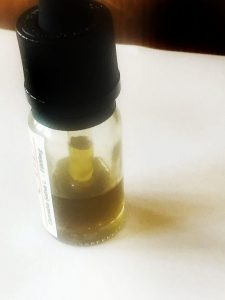
The cannabis was so successful at reducing the size of the tumour that the Grandmother-of-10 was able to forgo any further medical treatments.
“Going public with this was a big decision but I do not feel I can morally keep this to myself any longer.“
– Lin Coxon
Discussing the amazing results the cannabis had on her cancer, Lin said:
“I was diagnosed on June 28 (2017) and obviously, it was a major shock.
“I did some reading in the days that followed and saw there were reports that cannabis oil, which is available as a food supplement, could have beneficial effects so I decided I had nothing to lose.
“By July 24 I could not feel the tumour, before it had felt hard.
“With my chemotherapy due to start on August 23, I asked if I could have another scan but the hospital said no, so my GP suggested I had it done privately which I did on August 21.
“The doctor at the Nuffield Hospital was staggered when he saw the tumour had shrunk from 33mm to 11mm and my lymph nodes had gone from 25mm to 10mm.
“He did a mammogram and saw the whole density had changed which was amazing news, so as it was shrinking so dramatically I spoke to my consultant and deferred the chemotherapy.
“I am still taking the cannabis oil and the tumour is still shrinking and is now down to 7mm with no medical treatment and the lymph nodes are down to 4mm.
“The clinician at the Royal Derby said I should still have chemotherapy but I said I didn’t want to as things were moving in the right direction. I asked my consultant if he would still be happy to monitor me and he said he would.
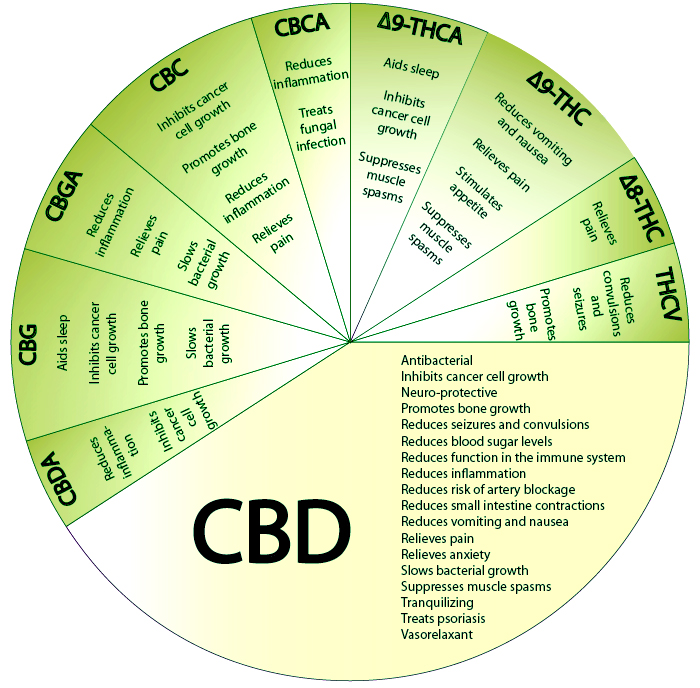
“Going public with this was a big decision but I do not feel I can morally keep this to myself any longer.
“I cannot say cannabis oil will work for anyone else but my experience would seem to show it is worth trying.
“I feel people have nothing to lose especially if they are waiting for chemotherapy.”
CBD is currently classified as a “food supplement,” and is available for private purchase. Lin purchased her CBD oil from a private company, as the treatment is not currently available on the NHS (except in rare cases, such as Billy Cadwell’s).
The grandmother claims a £39 bottle will last her 10 days.
Lin’s case has become so prolific that researchers at St. George’s, University of London, who are already investigating the potential medical properties of cannabinoids, have been in contact with the grandmother.
Dr Wai Liu, senior research fellow at St George’s, explained why his team had begun investigating Lin’s case: “I was very interested to hear of Lin’s case.
“Cannabidiol, which is just one element of the cannabis plant and one that does not have any psychoactive effect on people, has been shown to target communication signals that are malfunctioning in cancer cells.
“It is thought that by correcting these signals we can enable cancer cells to essentially die rather than duplicate. So it may hold the key to understanding how to defeat cancer in some areas.
“We at St George’s, University of London, have shown how this can be done. Although our data has mainly been laboratory-based, we have a growing and large collection of testimony from patients using cannabidiol, usually in a cannabis oil type product, who report positive effects on their battle with this dreadful disease.
“Lin’s story is one that adds to this growing list and we wish her all the best in her treatment which should always be under the supervision of her doctors.”
Research into cannabinoids has been heavily restricted in the UK, due to cannabis’ Schedule I status, which means the British Government view it as having no known medicinal benefits.
The only way further research can be conducted is by removing this Scheduling. Currently, research on THC can only be conducted if it is to investigate any potential harms.
Would you break the law to try and save your life?
Could CBD help treat schizophrenia?
Could CBD help treat schizophrenia?
- Recent studies show cannabidiol (CBD) may have the potential to treat neurological conditions such as schizophrenia and Tourettes
- Researchers are now calling for a closer look at CBD and its potential for certain mental health conditions for which more ‘traditional’ treatments have failed
- CBD improved cognition and social interaction in rats
- 220,000 people are being treated for schizophrenia in the UK by the NHS
Cannabis has often been attributed to causing mental illnesses, especially psychosis and schizophrenia. It is one of the only arguments left which the British Government use for justifying its Class B status.
Recent studies, however, have shown one of its essential components, cannabidiol (CBD), may have the potential to treat rather than trigger psychotic episodes.

Researchers at the University of Wollongong first discovered how CBD’s potential antipsychotic properties provided relief to schizophrenic patients.[/fusion_text][fusion_text]To understand the impact CBD could have on cognitive function, the team led by head researcher, Dr. Katrina Green, conducted a detailed review of 27 existing studies, uncovering some “fascinating insights” about its potential therapeutic value.
Discussing the findings from this initial study, Dr. Green explained:
“From this review, we found that CBD will not improve learning and memory in healthy brains, but may improve aspects of learning and memory in illnesses associated with cognitive impairment, including Alzheimer’s disease, as well as neurological and neuro-inflammatory disorders.
“Evidence suggests that CBD is neuroprotective and can reduce cognitive impairment associated with use of delta-9-tetrahydrocannabinol (THC), the main psychoactive component of cannabis.”
“…CBD may be able to treat some of the symptoms of schizophrenia that are seemingly resistant to existing medications.”
– Dr. Katrina Green
Inspired by these initial findings, Ph.D. candidate Ashleigh Osborne, along with Dr. Green, began their own clinical trial, testing the impact CBD had on lab rats.

Researchers infected pregnant rats in the 15th day of gestation with polyinosinic-polycytidilic acid, a compound commonly which generate psychiatric disorders such as schizophrenia and autism in rats.
To test the impact CBD had, male babies were injected with 10 milligrams per kilogram of CBD for 3 weeks.
The team then measured the body weight, food, and water intake of the offspring every week.
The rats’ working memory and cognition were tested using rewarded alternation in T-maze tests and the Novel Object Recognition test. Additionally, sociability was tested sociability using a social interaction test.
Discussing the results, Dr. Green said: “We found that CBD was able to restore recognition and working memory, as well as social behavior to normal levels.
“These findings are interesting because they suggest that CBD may be able to treat some of the symptoms of schizophrenia that are seemingly resistant to existing medications.”
Interestingly, researchers found that CBD does not have the often-dangerous side-effects which come with traditional, pharmaceutical medications:
“In addition, CBD treatment did not alter body weight or food intake, which are common side effects of antipsychotic drug treatment.”
While the results were positive, the researchers stressed that further research is needed to see if CBD has the same therapeutic effect in humans.
The same research team now plans to investigate neurotransmitter signals in the brain to gain a better understanding of CBD’s potential therapeutic effect.
With more and more research providing evidence that cannabinoids have the potential to treat neurological conditions, how much longer can the British Government deny cannabis’ medicinal value in modern society?
References and further Reading
https://www.ncbi.nlm.nih.gov/pubmed/27884751
https://www.ncbi.nlm.nih.gov/pubmed/28230072
https://www.ncbi.nlm.nih.gov/pubmed/28230072
Heroic Australian mother illegally makes medical marijuana to “save” brain-damaged daughter
Heroic Australian mother illegally makes medical marijuana to “save” brain-damaged daughter
- Katrina Spraggon makes cannabis oil to help treat her daughter’s cerebral palsy, refractory epilepsy and severe scoliosis
- Medical cannabis is legal in Australia but would cost her family thousands
- The heroic mother is calling for a change in the law to allow her to grow
- “I’d rather break the law than bury my daughter”
A mother of four from Queensland, Australia, has been illegally cooking cannabis into oil to treat her brain-damaged daughter who suffers from 19 chronic illnesses.
Katrina Spraggon insists that the oil she makes from cannabis is far more effective for treating her daughter, Kaitlyn’s, cerebral palsy, refractory epilepsy and severe scoliosis.
The mother has argued that medical cannabis not only works better but is safer than the “dangerous cocktail” of opioid medications Kaitlyn was prescribed by doctors.
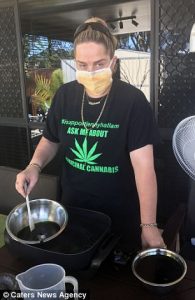
Katrina claims that cannabis has completely transformed the 8-year-old from an unresponsive, bed-ridden “zombie,” to such an extent that she heard her laugh for the first time.
Discussing the transformation, Katrina explained: “The first time I tried cannabis oil on my daughter, I witnessed a remarkable difference in just two days.
“Kaitlyn just became alive. It was absolutely incredible. She was responding and alert. Her seizures reduced dramatically.”
Katrina claims that rubbing just one drop of her homemade oil rubbed onto Kaitlyn’s gums at the onset of a seizure revives her quickly from her fits, shortening their recovery period.
“Over time she kept progressing more and more, and was no longer just a vegetable stuck in a wheelchair all the time.
“She began interacting with me in ways she never did before and she was able to play with her brothers and sister.

“Before cannabis oil, Kaitlyn would stare blankly into space and wouldn’t respond to anyone.
“I’d never even heard her laugh before and hearing it was the most beautiful sound in the world – she had only ever given me a little smile.

“It has changed her life dramatically and my only regret is not starting it sooner.
“There are virtually no side effects – she will just be a little hungrier than usual, have an increase in thirst and might crack up laughing. It’s amazing.
“Before we started the cannabis oil, when Kaitlyn would have a seizure she would go into cardiac and respiratory distress.
“This required me to give her CPR and drug her on so many different opiates. She would be like a zombie and completely zonked out for up to five days.
“Now after giving her cannabis oil for her seizures, she will be back up in 20 minutes playing, dancing and wanting food.”
While cannabis is legal for medical purposes in Australia, it can only be prescribed on a case-by-case basis for patients and must be imported from outside the country.
It is currently illegal for individuals to cultivate their own cannabis for medicinal purposes, leaving Katrina in the position of breaking the law every time she treats her daughter.
The former childcare worker decided to start growing due to the costly price of legal medical cannabis, as importing it from Canada or Denmark could have cost her up to £2,900.

The heroic mother is not afraid of the risk, as her daughter’s life and well-being are far more important:
“I am not worried about the legal consequences. I would prefer to break the law and my daughter have a quality of life than obey the law and bury my daughter.
“This is why I have been open and public for three years.
“It is a matter of life and death and I will never stop giving my child her medicine.
“I feel like I finally have my daughter and I will do anything to keep her alive.”
The pair’s heroic story has made national headlines in Australia. Katrina has even met with the Australian Prime Minister, Malcolm Turnbull, to plead her case.
If you want to help Kaitlyn and her family, the mother has set up an official GoFundMe page, to help fund Katrina’s medication.
Would you risk your freedom for your child? Have you got a similar story? Let us know in the comments.
Heroic Mother’s Help Legalise Medical Marijuana In Peru
Heroic Mother’s Help Legalise Medical Marijuana In Peru
- Peru’s Congress legalised cannabis for medicinal purposes last week
- Cannabis oil will now be legal to produce, import and sell
- The proposal to decriminalise the drug came after police raided a makeshift laboratory where a group of women made cannabis oil for their sick children
Peru has become the largest country in the world with access to legal medical marijuana,
after a bill decriminalizing the use of cannabis oil was passed in Peru’s conservative Congress last week.
Peru joins other South and Central American countries Uruguay, Mexico, Colombia, Chile and Argentina who have legalised the drug for medicinal and scientific purposes.
Winning the vote with a large majority, 68-5, the bill will be written into law in 60 days once ministers have decided on the regulations for producing and selling cannabis.
Discussing the vote, ruling party lawmaker Alberto Belaunde said: “Thousands of patients and their family members will have hope and a better quality of life.
“This is a historic moment and my dream is that empathy and evidence can continue to defeat fears and prejudices.” The bill was proposed by Peru’s President, Pedro Pablo Kuczynski, following a police raid on a makeshift laboratory producing cannabis oil, run by a group of heroic mothers, “Buscando Esperanza” (Searching for Hope), who turned to cannabis to treat their epileptic children.
Dental technician Ana Alvarez, 43, founded the Searching For Hope after seeing a rapid improvement in her 17-year-old epileptic son’s condition after swapping his pharmaceutical drugs for cannabis oil.
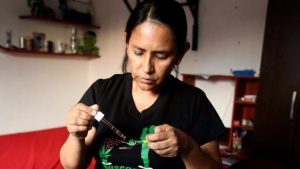
Anthony, Ana’s son, suffers a rare and severe form of epilepsy, called Lennox-Gastaut syndrome, as well as tuberous sclerosis, which causes tumours to grow on the brain and other organs. Before cannabis, he was suffering up to 7 life-threatening seizures a day.
Speaking to The Guardian after the raid, Ana explained how cannabis helped her son and inspired her to risk her freedom for her child’s health:
“After three days of taking marijuana oil, Anthony started to reconnect with life, he began to socialise, he began to sleep, he began to eat, and little by little he started to recover.
“The change after three days was something extraordinary and from that moment my fight began.”
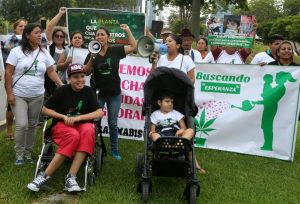
Discussing the announcement, Ana explained why the bill may not be as beneficial as it may seem on paper: “We’re very happy with the fact that Peruvian law has approved this. But we’re not totally satisfied.”
Expressing fears that the new bill, which only allows strictly regulated local production of cannabis oil, excluding organisations like Searching For Hope, Ana added: “We want associations like ours to be included in the production of this natural medicine.”
“Thousands of patients and their family members will have hope and a better quality of life.”
– Alberto Belaunde, ruling party lawmaker.
Homemade oil from Searching For Hope is produced at a fraction of the cost than it will cost the government. Personally making cannabis oil allows patients to personalize their medication to tailor their specific medical condition, something which could be eradicated with the new bill.
The exact laws and regulations surrounding medical marijuana in Peru will now be discussed by ministers over the next 60 days.
The tireless work from the heroic mothers at Searching For Hope undoubtedly fueled the move to legalise medical cannabis in Peru. Could the same be true for the UK?
With courageous mothers appearing on national TV, such as Callie Blackwell and Charlotte Cadwell, to discuss how they “saved” their children with cannabis, could a similar progress be made in the UK?


